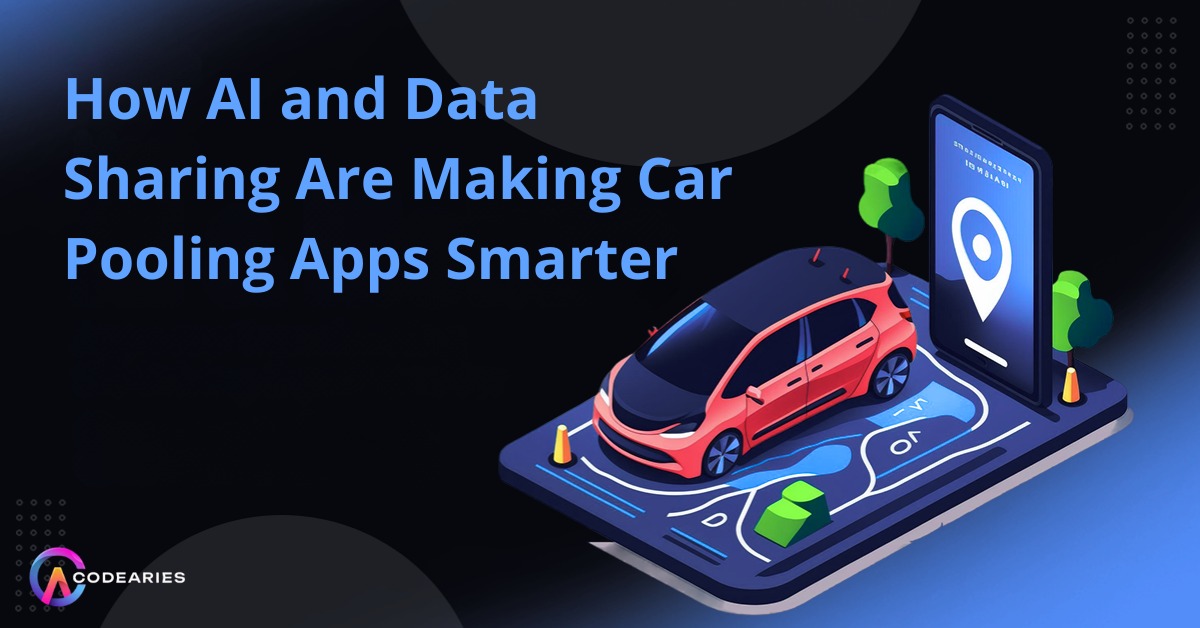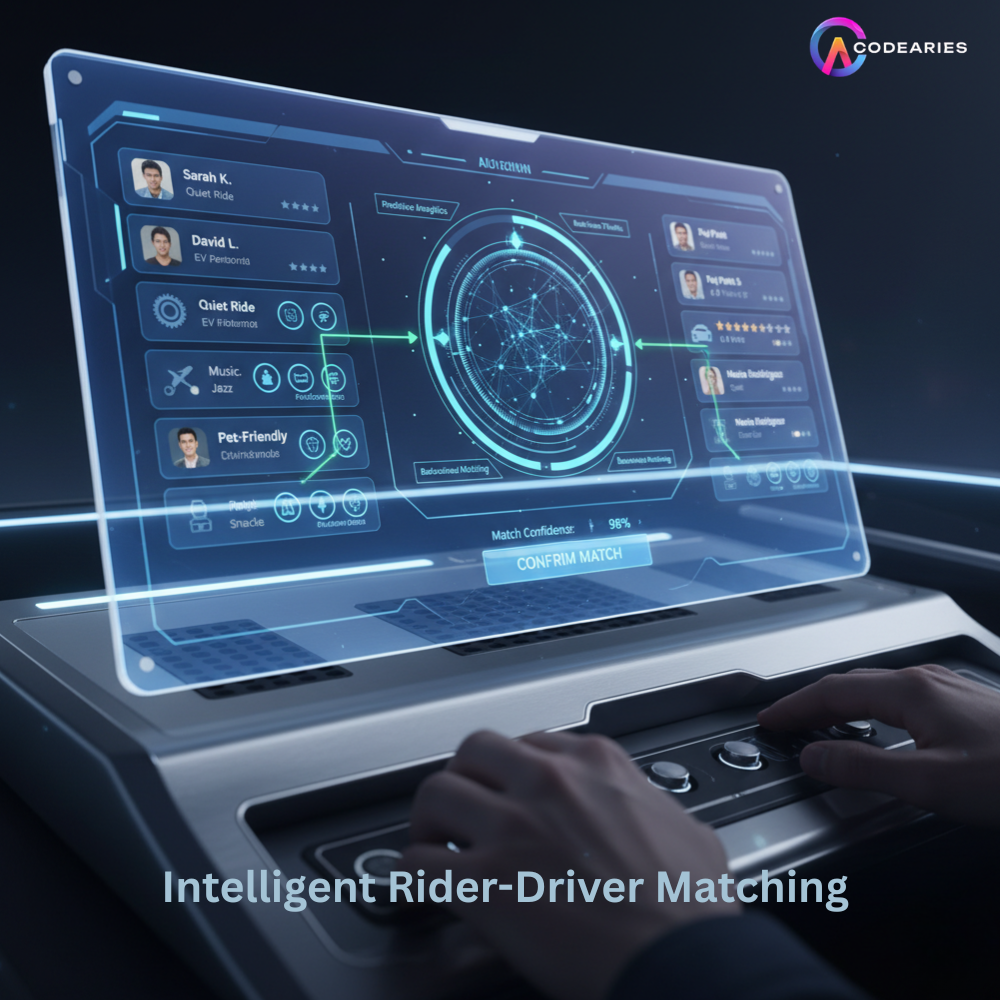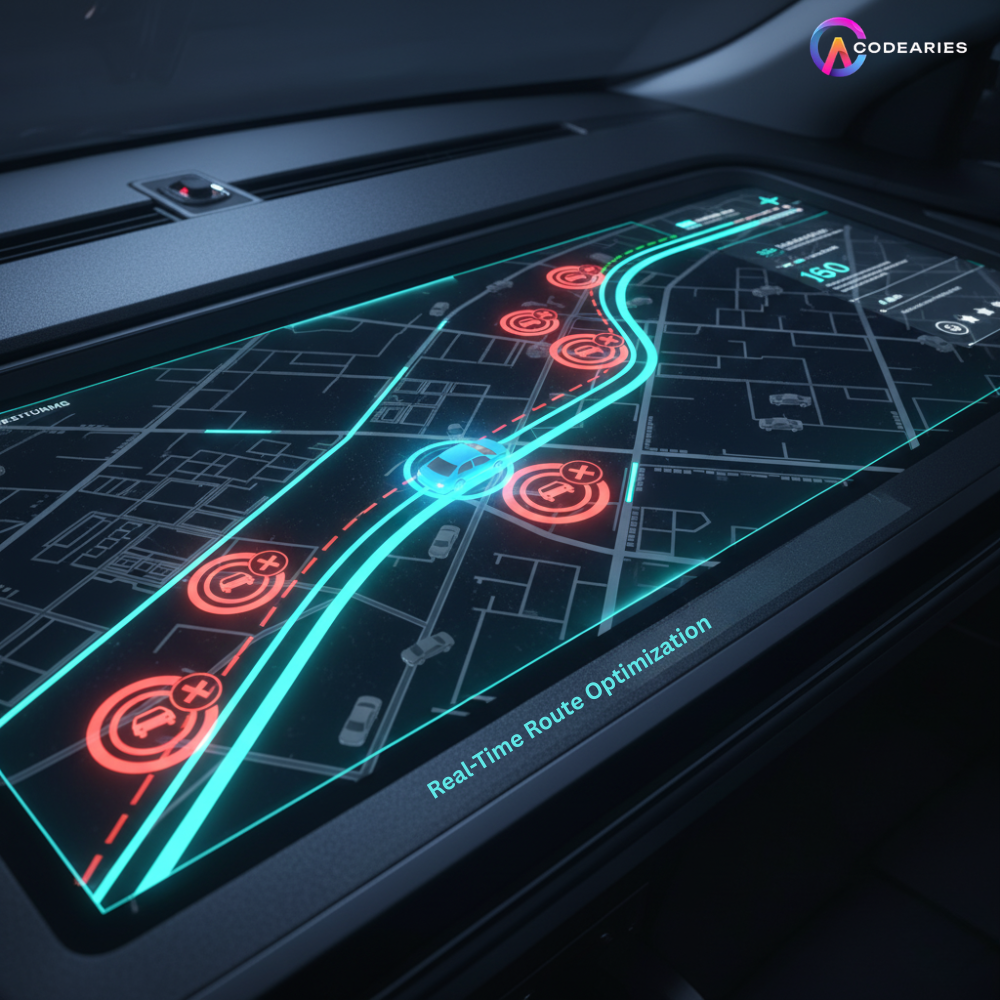
The transportation sector is changing significantly due to artificial intelligence (AI) and data sharing. One of the most notable examples of this change is car pooling apps. These have transformed from simple ride-sharing platforms into smart systems that optimize routes, match riders, and reduce environmental impact, all thanks to real-time data and innovative algorithms.
As cities become more crowded and people focus more on cost, time, and sustainability, car pooling apps that use AI and data sharing have emerged as effective solutions that are reshaping how we move in urban areas.
In this blog, we’ll look at how AI and data sharing come together to create smarter car pooling apps. We will discuss the benefits and challenges and show how Codearies helps businesses create modern, data-driven mobility platforms for the future.
The Rise of Smarter Car Pooling
Car pooling originally started as informal arrangements that were slow, inconvenient, and limited in scale. Then ride-sharing apps like Uber Pool and BlaBlaCar entered the scene, making the process digital and providing convenience and scalability. Now, the “smart” part comes from technologies that analyze large datasets and continuously improve the experience.
How AI Enhances Car Pooling Apps
1. Intelligent Rider-Driver Matching
AI algorithms analyze individual locations, destinations, preferences, historical ride patterns, and traffic conditions to effectively match riders for seamless ridesharing. This goes beyond simply checking who is nearby; matching also considers:
- Route compatibility and detours
- Passenger preferences for social dynamics and vehicle type
- Predicted trip durations and time windows
The outcome is a smooth car pool that maximizes vehicle occupancy and minimizes travel time, cost, and emissions.

2. Real-Time Route Optimization
AI engines use dynamic traffic data, road closures, weather, and rider schedules to adjust routes during trips. This flexibility:
- Cuts down commute times
- Improves fuel efficiency and battery life for electric vehicles
- Increases on-time arrivals, boosting rider satisfaction
With millions of data points processed every second, AI keeps journeys smooth and predictable.

3. Demand Forecasting and Resource Allocation
AI predicts peak hours, popular routes, and regional demand surges by analyzing historical booking data, events, and weather. This allows:
- Pre-positioning vehicles where they’ll be needed most
- Incentivizing drivers to cover underserved areas
- Balancing supply and demand to reduce wait times and cancellations
Forecasting boosts operational efficiency and profitability.
4. Dynamic Pricing and Incentives
AI calculates optimal pricing that balances what customers can afford, driver earnings, and platform margins. Real-time data on demand, driver availability, and trip length feed into pricing models, enabling:
- Surge pricing during high demand
- Discounts and loyalty rewards tailored per user behavior
- Group pricing for shared rides
Dynamic pricing motivates participation and maximizes marketplace health.
5. Enhanced Safety and Trust
AI-driven identity verification, behavioral analysis, and anomaly detection help reduce fraud, fake accounts, and misconduct. Features include:
- Real-time driver and passenger monitoring
- Route deviation alerts
- Automated reporting and escalation workflows
Safety drives user trust crucial for mass adoption.
The Role of Data Sharing
Collaborating Across Platforms and Cities
Data sharing between ride-sharing apps, public transit, GPS services, and local governments can create smarter car pools by:
- Aggregating demand signals from multiple sources
- Integrating layered transport options (e.g., park-and-ride, bike-share links)
- Enhancing routing with city traffic management systems
Open APIs and data trusts enhance efficiency and user convenience.
Privacy and Security Considerations
Balancing data sharing with user privacy is essential. Techniques like anonymization, differential privacy, and secure multi-party computation allow for valuable insights without exposing personal information, in line with GDPR, CCPA, and other regulations.
Benefits of AI and Data Sharing Powered Car Pooling Apps
| Benefit | Description |
| Reduced Commute Times | Efficient matching and routing speed journeys. |
| Lower Costs | Optimal pooling divides fare, cutting rider expenses. |
| Environmental Impact | Fewer cars on road reduce emissions and congestion. |
| Enhanced Safety | Continuous monitoring and fraud detection protect everyone. |
| Better Resource Utilization | Demand prediction optimizes vehicle distribution and driver hours. |
| Stronger User Engagement | Personalized experiences and incentives boost platform loyalty. |
Challenges and Considerations
- System Complexity: Accurate matching requires advanced AI and strong backend systems.
- Privacy Compliance: Following global data laws demands careful planning and oversight
- User Adoption: A simple, user-friendly interface and trustworthiness are key for widespread acceptance.
- Integration: Connecting different data sources while keeping performance and reliability is crucial.
How Codearies Empowers Next-Gen Car Pooling Apps
At Codearies, we work with mobility innovators to build smart, scalable ride-sharing platforms driven by AI and data. Our experienced team combines AI knowledge, software engineering, and regulatory expertise to create user-focused, secure, and future-ready solutions.
Our Offering Includes:
- Custom AI Models: Tailored rider-driver matching, demand forecasting, dynamic pricing, and route optimization for your needs.
- Data Engineering and Integration: Gathering real-time data feeds, traffic APIs, and public transport elements for a complete smart mobility solution.
- Robust Security and Compliance: Frameworks designed to protect user data while aligning with GDPR, CCPA, and new regulations.
- Intuitive UI/UX: Clean, accessible designs that demystify AI-powered services and enhance trust.
- Continuous Analytics and Optimization: Implementing AI monitoring and feedback systems that enhance matching accuracy, user satisfaction, and operational metrics.
- End-to-End Development: From MVPs to full-scale platforms with support across devices, scalable infrastructure, and maintenance.
- Consulting and Strategy: Guiding you through technical, legal, and market challenges to create successful ride-sharing businesses.
With Codearies as your tech partner, you can unlock the full potential of AI and data-sharing advancements, creating car pooling apps that satisfy users, optimize resource use, and contribute to smarter, greener cities.
FAQs
Can Codearies integrate AI-powered matchmaking into existing carpool apps?
Yes, we focus on modular AI integrations that improve your platform’s matching, routing, and pricing abilities.
How does data sharing improve app accuracy and user experience?
Pooling data from various sources allows for more accurate demand forecasts, route optimizations, and tailored recommendations.
How do you ensure user data privacy while sharing data?
We use advanced anonymization, encryption, and fully comply with global data protection laws.
What’s the typical development timeline for AI-driven carpooling app features?
Core AI features can be implemented within 3 to 6 months, with ongoing improvements as data and user feedback increase.
Can Codearies help scale my carpooling app globally?
Absolutely. We design systems and processes for various markets, languages, and regulations to ensure smooth expansion.


